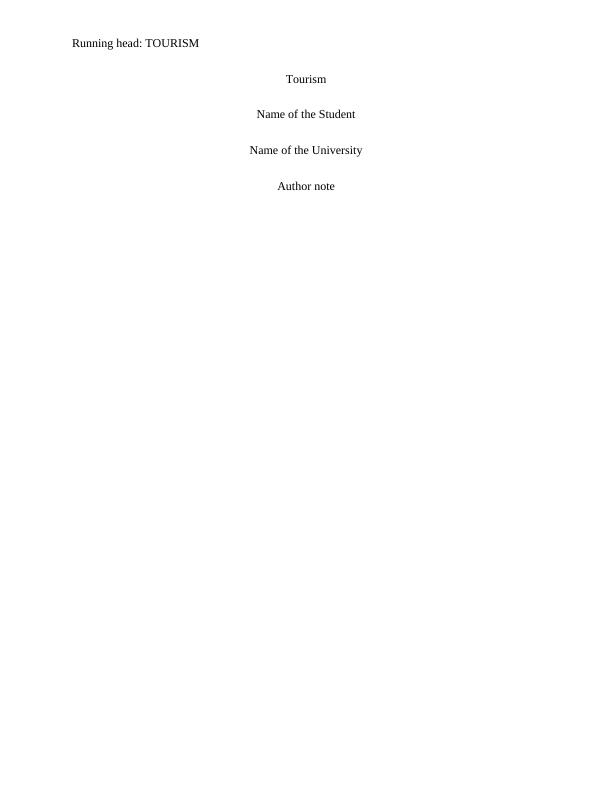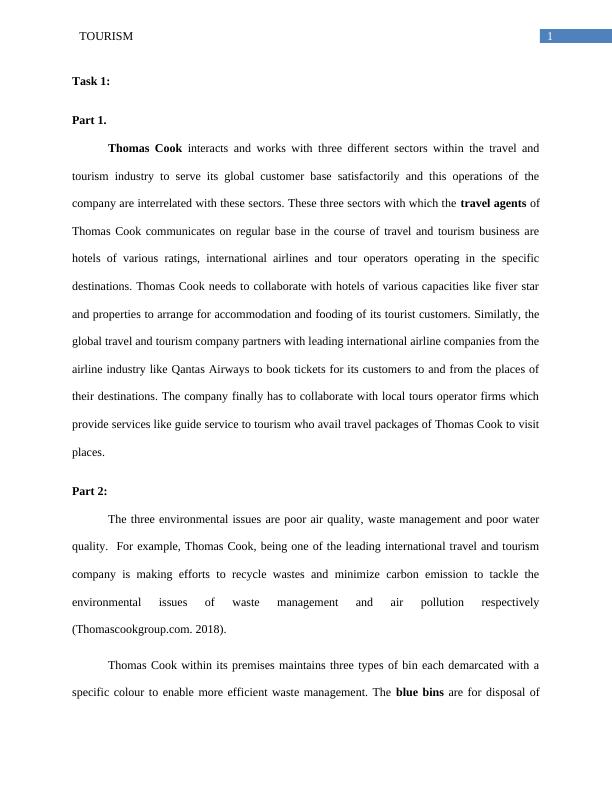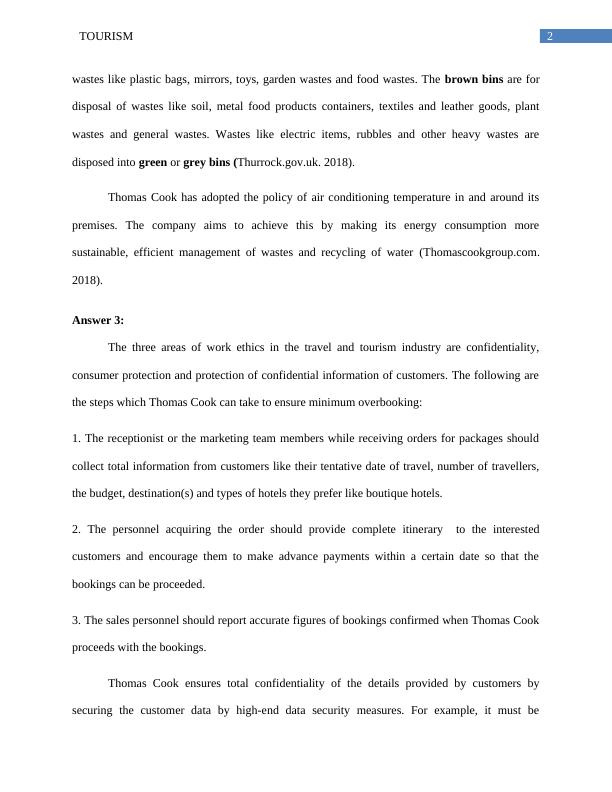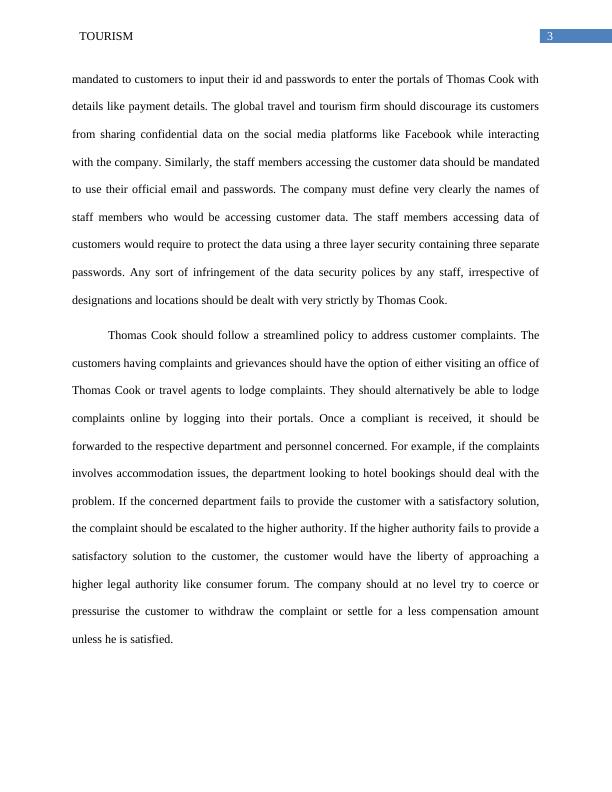Interactions of Thomas Cook with Sectors in Travel and Tourism Industry
Added on 2023-06-03
13 Pages1690 Words432 Views
Running head: TOURISM
Tourism
Name of the Student
Name of the University
Author note
Tourism
Name of the Student
Name of the University
Author note

1TOURISM
Task 1:
Part 1.
Thomas Cook interacts and works with three different sectors within the travel and
tourism industry to serve its global customer base satisfactorily and this operations of the
company are interrelated with these sectors. These three sectors with which the travel agents of
Thomas Cook communicates on regular base in the course of travel and tourism business are
hotels of various ratings, international airlines and tour operators operating in the specific
destinations. Thomas Cook needs to collaborate with hotels of various capacities like fiver star
and properties to arrange for accommodation and fooding of its tourist customers. Similatly, the
global travel and tourism company partners with leading international airline companies from the
airline industry like Qantas Airways to book tickets for its customers to and from the places of
their destinations. The company finally has to collaborate with local tours operator firms which
provide services like guide service to tourism who avail travel packages of Thomas Cook to visit
places.
Part 2:
The three environmental issues are poor air quality, waste management and poor water
quality. For example, Thomas Cook, being one of the leading international travel and tourism
company is making efforts to recycle wastes and minimize carbon emission to tackle the
environmental issues of waste management and air pollution respectively
(Thomascookgroup.com. 2018).
Thomas Cook within its premises maintains three types of bin each demarcated with a
specific colour to enable more efficient waste management. The blue bins are for disposal of
Task 1:
Part 1.
Thomas Cook interacts and works with three different sectors within the travel and
tourism industry to serve its global customer base satisfactorily and this operations of the
company are interrelated with these sectors. These three sectors with which the travel agents of
Thomas Cook communicates on regular base in the course of travel and tourism business are
hotels of various ratings, international airlines and tour operators operating in the specific
destinations. Thomas Cook needs to collaborate with hotels of various capacities like fiver star
and properties to arrange for accommodation and fooding of its tourist customers. Similatly, the
global travel and tourism company partners with leading international airline companies from the
airline industry like Qantas Airways to book tickets for its customers to and from the places of
their destinations. The company finally has to collaborate with local tours operator firms which
provide services like guide service to tourism who avail travel packages of Thomas Cook to visit
places.
Part 2:
The three environmental issues are poor air quality, waste management and poor water
quality. For example, Thomas Cook, being one of the leading international travel and tourism
company is making efforts to recycle wastes and minimize carbon emission to tackle the
environmental issues of waste management and air pollution respectively
(Thomascookgroup.com. 2018).
Thomas Cook within its premises maintains three types of bin each demarcated with a
specific colour to enable more efficient waste management. The blue bins are for disposal of

2TOURISM
wastes like plastic bags, mirrors, toys, garden wastes and food wastes. The brown bins are for
disposal of wastes like soil, metal food products containers, textiles and leather goods, plant
wastes and general wastes. Wastes like electric items, rubbles and other heavy wastes are
disposed into green or grey bins (Thurrock.gov.uk. 2018).
Thomas Cook has adopted the policy of air conditioning temperature in and around its
premises. The company aims to achieve this by making its energy consumption more
sustainable, efficient management of wastes and recycling of water (Thomascookgroup.com.
2018).
Answer 3:
The three areas of work ethics in the travel and tourism industry are confidentiality,
consumer protection and protection of confidential information of customers. The following are
the steps which Thomas Cook can take to ensure minimum overbooking:
1. The receptionist or the marketing team members while receiving orders for packages should
collect total information from customers like their tentative date of travel, number of travellers,
the budget, destination(s) and types of hotels they prefer like boutique hotels.
2. The personnel acquiring the order should provide complete itinerary to the interested
customers and encourage them to make advance payments within a certain date so that the
bookings can be proceeded.
3. The sales personnel should report accurate figures of bookings confirmed when Thomas Cook
proceeds with the bookings.
Thomas Cook ensures total confidentiality of the details provided by customers by
securing the customer data by high-end data security measures. For example, it must be
wastes like plastic bags, mirrors, toys, garden wastes and food wastes. The brown bins are for
disposal of wastes like soil, metal food products containers, textiles and leather goods, plant
wastes and general wastes. Wastes like electric items, rubbles and other heavy wastes are
disposed into green or grey bins (Thurrock.gov.uk. 2018).
Thomas Cook has adopted the policy of air conditioning temperature in and around its
premises. The company aims to achieve this by making its energy consumption more
sustainable, efficient management of wastes and recycling of water (Thomascookgroup.com.
2018).
Answer 3:
The three areas of work ethics in the travel and tourism industry are confidentiality,
consumer protection and protection of confidential information of customers. The following are
the steps which Thomas Cook can take to ensure minimum overbooking:
1. The receptionist or the marketing team members while receiving orders for packages should
collect total information from customers like their tentative date of travel, number of travellers,
the budget, destination(s) and types of hotels they prefer like boutique hotels.
2. The personnel acquiring the order should provide complete itinerary to the interested
customers and encourage them to make advance payments within a certain date so that the
bookings can be proceeded.
3. The sales personnel should report accurate figures of bookings confirmed when Thomas Cook
proceeds with the bookings.
Thomas Cook ensures total confidentiality of the details provided by customers by
securing the customer data by high-end data security measures. For example, it must be

3TOURISM
mandated to customers to input their id and passwords to enter the portals of Thomas Cook with
details like payment details. The global travel and tourism firm should discourage its customers
from sharing confidential data on the social media platforms like Facebook while interacting
with the company. Similarly, the staff members accessing the customer data should be mandated
to use their official email and passwords. The company must define very clearly the names of
staff members who would be accessing customer data. The staff members accessing data of
customers would require to protect the data using a three layer security containing three separate
passwords. Any sort of infringement of the data security polices by any staff, irrespective of
designations and locations should be dealt with very strictly by Thomas Cook.
Thomas Cook should follow a streamlined policy to address customer complaints. The
customers having complaints and grievances should have the option of either visiting an office of
Thomas Cook or travel agents to lodge complaints. They should alternatively be able to lodge
complaints online by logging into their portals. Once a compliant is received, it should be
forwarded to the respective department and personnel concerned. For example, if the complaints
involves accommodation issues, the department looking to hotel bookings should deal with the
problem. If the concerned department fails to provide the customer with a satisfactory solution,
the complaint should be escalated to the higher authority. If the higher authority fails to provide a
satisfactory solution to the customer, the customer would have the liberty of approaching a
higher legal authority like consumer forum. The company should at no level try to coerce or
pressurise the customer to withdraw the complaint or settle for a less compensation amount
unless he is satisfied.
mandated to customers to input their id and passwords to enter the portals of Thomas Cook with
details like payment details. The global travel and tourism firm should discourage its customers
from sharing confidential data on the social media platforms like Facebook while interacting
with the company. Similarly, the staff members accessing the customer data should be mandated
to use their official email and passwords. The company must define very clearly the names of
staff members who would be accessing customer data. The staff members accessing data of
customers would require to protect the data using a three layer security containing three separate
passwords. Any sort of infringement of the data security polices by any staff, irrespective of
designations and locations should be dealt with very strictly by Thomas Cook.
Thomas Cook should follow a streamlined policy to address customer complaints. The
customers having complaints and grievances should have the option of either visiting an office of
Thomas Cook or travel agents to lodge complaints. They should alternatively be able to lodge
complaints online by logging into their portals. Once a compliant is received, it should be
forwarded to the respective department and personnel concerned. For example, if the complaints
involves accommodation issues, the department looking to hotel bookings should deal with the
problem. If the concerned department fails to provide the customer with a satisfactory solution,
the complaint should be escalated to the higher authority. If the higher authority fails to provide a
satisfactory solution to the customer, the customer would have the liberty of approaching a
higher legal authority like consumer forum. The company should at no level try to coerce or
pressurise the customer to withdraw the complaint or settle for a less compensation amount
unless he is satisfied.

End of preview
Want to access all the pages? Upload your documents or become a member.
Related Documents
Tourism Industry Essay - Hilton Hotellg...
|9
|2053
|85
The Impact of Tourism Industry on Climate Changelg...
|4
|956
|451
(P25) The Travel and Tourism Sectorlg...
|1
|286
|346
Collaboration in Travel and Tourism Industry: A Case Study of Thomas Cook British Airwayslg...
|13
|1861
|334
(P25) Marketing in Travel and Tourismlg...
|7
|337
|136
The Role of the Marketing Mix in the Travel and Tourism Sectorlg...
|12
|1398
|264
